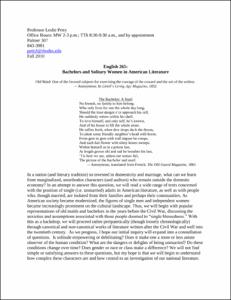Please use this identifier to cite or link to this item:
http://hdl.handle.net/10267/15457| Title: | ENGL 265-01/02, Bachelors and Solitary Women in American Literature, Fall 2010 |
| Authors: | Petty, Leslie |
| Keywords: | English, Department of;Syllabus;Curriculum;Academic departments;Text;2010 Fall |
| Issue Date: | 25-Aug-2010 |
| Publisher: | Memphis, Tenn. : Rhodes College |
| Series/Report no.: | Syllabi CRN;11094 Syllabi CRN;11095 |
| Abstract: | Old Maid: One of the favored subjects for exercising the courage of the coward and the wit of the witless. -- Anonymous. In Littell’s Living Age Magazine, 1852 The Bachelor: A Snail No friends, no family to him belong. Who only lives for one the whole day long; Should the least danger e‟er approach his cell, He suddenly retires within his shell. To love himself, and only self, he‟s known, And of his house to fill the whole alone. He sallies forth, when dew drops deck the thorns, To plant some friendly neighbor‟s head with horns. From gem to gem with trail impure he creeps, And each fair flower with slimy kisses sweeps. Within himself as in a prison fast, At length grown old and sad he breathes his last, „Tis here we see, unless our senses fail, The picture of the bachelor and snail. -- Anonymous, translated from French. The Old Guard Magazine, 1865 In a nation (and literary tradition) so invested in domesticity and marriage, what can we learn from marginalized, unorthodox characters (and authors) who remain outside the domestic economy? In an attempt to answer this question, we will read a wide range of texts concerned with the position of single (i.e. unmarried) adults in American literature, as well as with people who, though married, are isolated from their families and perhaps their communities. As American society became modernized, the figures of single men and independent women became increasingly prominent on the cultural landscape. Thus, we will begin with popular representations of old maids and bachelors in the years before the Civil War, discussing the anxieties and assumptions associated with those people doomed to “single blessedness.” With this as a backdrop, we will proceed rather peripatetically (though loosely chronologically) through canonical and non-canonical works of literature written after the Civil War and well into the twentieth century. As we progress, I hope our initial inquiry will expand into a constellation of questions. Is solitude empowering or debilitating? Does it make one a more or less astute observer of the human condition? What are the dangers or delights of being unmarried? Do these conditions change over time? Does gender or race or class make a difference? We will not find simple or satisfying answers to these questions, but my hope is that we will begin to understand how complex these characters are and how central to an investigation of our national literature. |
| Description: | This syllabus was submitted to the Office of Academic Affairs by the course instructor. Uploaded by Archives RSA Josephine Hill. |
| URI: | http://hdl.handle.net/10267/15457 |
| Appears in Collections: | Course Syllabi |
Files in This Item:
| File | Description | Size | Format | |
|---|---|---|---|---|
| 2010_FALL_ENGL_265_01_11094.pdf | 128.58 kB | Adobe PDF |  View/Open |
Items in DSpace are protected by copyright, with all rights reserved, unless otherwise indicated.